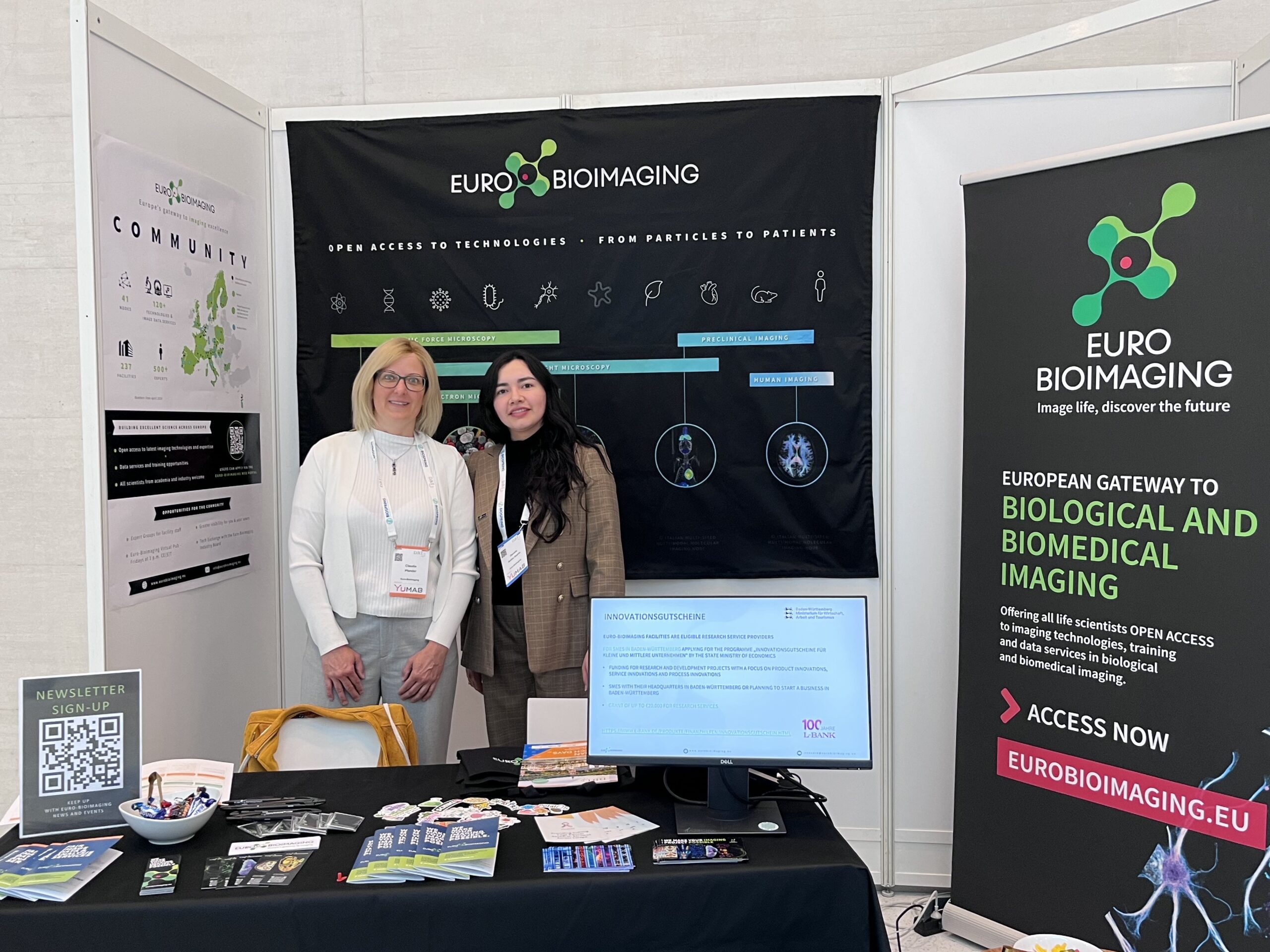
New facilities join Euro-BioImaging Nodes
We are delighted to welcome new facilities into the Euro-BioImaging family as part of our recent Node upgrade. Four Euro-BioImaging Nodes - Swedish NMI, French BioImaging Node, the Advanced Light & Electron Microscopy Node Prague, and the Advanced Light Microscopy & Medical Imaging Node Brno – applied for Node upgrades in January 2024. After a stringent evaluation process by the Scientific Advisory Board (SAB), these facilities were recommended for approval and reviewed and approved by the Euro-BioImaging Board in May 2024. With these upgrades, we are delighted to welcome 20 new facilities to the Euro-BioImaging family as part of this process. The Euro-BioImaging map now includes new pins in Strasbourg and Toulouse, France, Prague and Brno, Czech Republic, as well as Lund and Stockholm, Sweden. Learn more about the new facilities and how they enhance the Euro-BioImaging service offer.
Advanced Light & Electron Microscopy Prague Node
The Prague Node, spanning across Prague and České Budějovice, offers a comprehensive range of microscopy techniques in advanced light and electron microscopy, encompassing a variety of systems from confocal and light-sheet to electron microscopy techniques. Additionally, the node is active in organizing training and courses in both basic and advanced microscopy techniques.
The Node Upgrade brings on board the Microscopy Service Centre of the Institute of Experimental Medicine CAS (IEM) in Prague. The addition of the IEM's Intravital Imaging Laboratory will bring advanced small rodent-intravital imaging possibilities, complete with a fully equipped surgery room and animal housing, operated by trained staff. This upgrade, complemented by other IEM methods like confocal, live super-resolution, and lightsheet microscopy, significantly broadens the Node's capacities.
Website of the new facility: https://www.iem.cas.cz/en/department/microscopy-unit/
Advanced Light Microscopy & Medical Imaging Node Brno
The mixed Nodes that currently offer advanced light microscopy tools with a focus on live cell label-free imaging and super-resolution and lightsheet imaging for organoids and cleared tissues, as well as MRI imaging for clinical research. The Node provides unified access to these systems and training for researchers in their use and image data analysis.
The Upgrade of the Node brings on board two additional facilities.
The Core facility Electron microscopy and Raman spectroscopy (ISI EM), enhancing its range of advanced microscopy/spectroscopy techniques. ISI EM is the only Czech-BioImaging facility of electron microscopy and Raman spectroscopy in the Moravian region, providing chemical and cryogenic preparation of biological samples, imaging using SEM, cryo-SEM, STEM, FIB-SEM, Raman spectroscopy analysis and also an individual approach in the area of specialized microfluidic techniques. Therefore, the entry of the ISI EM into the Brno Node complements the microscopy services for Euro-BioImaging users.
The second added facility is the Centre for Biomedical Image Analysis (CBIA) of the Faculty of Informatics at Masaryk University. It is specialized in providing advanced Image Analysis services, both for biological and medical data, in the frame of Czech-BioImaging including the development of software tools coping with difficult tasks unsolvable using existing software tools. It is equipped with high-capacity storage and high-performance computational servers enabling the development and utilization of the latest deep learning solutions. Its inclusion strengthens the portfolio of the Brno Node in the quality and extent of data analysis services.
Swedish NMI Node
The Swedish NMI Node is undergoing a strategic expansion to incorporate the expertise and resources of Karolinska Institutet and Lund University. This expansion aims to augment the Swedish Node with a comprehensive suite of advanced microscopy and medical imaging technologies, further complemented by the unique knowledge and experience of these institutions.
Some of the highlights of systems provided by the Live Cell Imaging core facility (LCI) at Karolinska Institute, are a micropatterning system enabling researchers to create intricate and customizable protein patterns on glass or gels, and a lightsheet system with a unique Airy beam illumination for high-resolution imaging of large samples, including intact organs and organisms.
The Lund University Bioimaging Centre (LBIC) brings a comprehensive set of technologies across scales, from cryo-EM and lightsheet fluorescence systems and expertise in optical clearing techniques, which will enable researchers to study complex biological processes in living organisms, while data-driven microscopy workflows will facilitate the analysis of large datasets. Preclinical nuclear medicine facilities, including PET/CT, SPECT/CT, and μCT, will provide valuable tools for preclinical imaging of disease models. The 9.4T preclinical MR scanner will offer high-resolution imaging of small rodent models, while the 7T human MR system will enable advanced imaging of human subjects.
The new imaging facilities at LCI and LBIC represent a significant advancement in the
field of biomedical imaging, complementing the Node's existing strengths and significantly enhancing the Node's capacity to support and facilitate cutting-edge research among Swedish and European scientists.
French BioImaging Node
France-BioImaging (FBI) is the French Research Infrastructure for biological imaging and the French Node of Euro-BioImaging. FBI is a distributed infrastructure built around geographical Nodes with complementary technological and scientific excellence domains. This crossover creates synergies at the national level and enables coverage of a large diversity of user needs: access to instruments, expertise in methods and models, and scientific contextualization. FBI plays an essential role in enabling competitive research in many fields, from fundamental questions in cell and developmental biology to preclinical research, thereby impacting a variety of domains such as agronomy, marine biology and human health. With the aim to add new technological and scientific expertise to FBI portfolio and improve its geographical coverage, two new sub-Nodes now join the French BioImaging Node in Euro-BioImaging.
The Alsace Node constitutes 7 institutes and 6 facilities. Its key strength is to combine technologies and expertise that create a workflow spanning large biological length scales, from single molecules to whole animals. Additionally, the 6 R&D teams bring along impressive advances in probe chemistry, biophotonics and analysis software.
The Toulouse Node is built around one unique platform gathering 9 facilities, combining various approaches to biological imaging that include fluorescence, EM and cytometry. The node offers capabilities that cater to mechanobiology, microfluidics, cryo-EM, organoids, and several niche imaging techniques such as Random Illumination Microscopy and computational imaging.
The new Node sites are already an integral component of the FBI community, enabling the addition of key fields: probe developments, organ-on-chip and mechanobiology. They will participate in developing, implementing and providing access to an array of next-generation imaging methods, generating significant added value to the research community and providing a fertile ground for European project participation.

More news from Euro-BioImaging


April 17, 2025
Ilaria Testa lights up EVOLVE Mentoring Masterclass on interdisciplinary science, SMART microscopy and team building
In a compelling EVOLVE Mentoring Masterclass hosted by Euro-BioImaging, Professor Ilaria Testa offered a multifaceted look into her scientific journey, from her interdisciplinary path…
